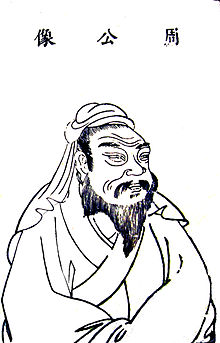Duke of Zhou
The Duke of Zhou ( Chinese 周公 , Pinyin Zhōu gōng ) or Duke Dan von Zhou ( Chinese 周公 旦 , Pinyin Zhōu gōng Dàn ), also Shu Dan ( Chinese 叔 旦 , Pinyin shū Dàn ), was a famous Chinese statesman at the beginning of the Zhou Dynasty ( 11th Century BC ). He was the son of King Wen and the younger brother of King Wu .
King Wu died just three years after defeating the Shang Dynasty , leaving the task of consolidating the dynasty's power to the Duke of Zhou, who ruled in a reign . He put down the rebellion of Guanshu (管叔), Caishu (蔡 叔) and Huoshu (霍 叔), who collaborated with Wu Geng (武庚). He fought with the rulers of the eastern states who united with the remnants of the Shang against Zhou. The east was conquered in five years.
Legend also associates it with works on rites and music.
His words are passed down in different chapters of the Book of Documents ( Shangshu ): The Great Speech ( Chinese 大 誥 , Pinyin Dà gào ), The Appointment of (Prince of) Kang ( Chinese 康 誥 , Pinyin Kāng gào ), The numerous officials ( Chinese 多 士 , Pinyin Duō shí ), avoiding comfort ( Chinese 無 逸 , Pinyin Wú yí ), establishment of a government ( Chinese 立 政 , Pinyin Lí zhèng ).
In 2004, Chinese archaeologists reported that they may have discovered Zhou Gong's tomb complex in Qishan County , Shaanxi Province .
Remarks
- ↑ The designation as Duke is a translation of the Chinese title Gong .
- ↑ The designation as king is a translation of the Chinese title Wang , which was given to sovereign rulers, kings, at that time.
See also
Web links
| personal data | |
|---|---|
| SURNAME | Duke of Zhou |
| ALTERNATIVE NAMES | 周公 (Chinese); Zhōu gōng; Duke Dan of Zhou; 周公 旦 (Chinese); Zhōu gōng Dàn; Shu Dan; 叔 旦 (Chinese); shū Dàn |
| BRIEF DESCRIPTION | Chinese statesman |
| DATE OF BIRTH | 11th century BC Chr. |
| DATE OF DEATH | 11th century BC BC or 10th century BC Chr. |
